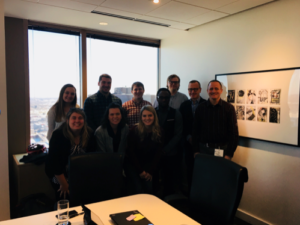As part of their learning about environmental sustainability, social equity, and urban planning, students in the Just Sustainabilities J-Term course explored advocacy for alternative transportation in downtown Des Moines. Although it was one of the coldest days of the winter, we bravely ventured into the streets and bus stations to explore how community leaders are working to make the city more friendly to people who cannot or choose not to rely on private cars to move around.

We first stopped in a conference room at the law firm of Faegre Baker Daniels, on the 33rd floor of Des Moines tallest skyscraper. There, we met with firm partner and Drake law alumnus Larry James, as well as with Jeremy Lewis, the director of the Des Moines Bike Collective. Larry and Jeremy told us about their work on the Connect Downtown plan, which is an urban planning document that identifies key ways to increase the walkability and bikeability of the downtown area. They described the research that went into developing the plan, but just as importantly, they also told us about the political processes involved in building support for the plan on the Des Moines City Council and in the downtown business community. After a question and answer period, we made sure to check out the views of the city from above and to take plenty of pictures!
From there, we walked ten blocks into the East Village to look at the East Grand bike lane demonstration project. As a first step towards making the Connect Downtown plan into reality, the city of Des Moines has built protected bike lanes on both sides of East Grand. While ordinary bike lanes are only marked with paint, the city has installed reflective posts to increase bike safety. In addition, it has created spaces for parallel parking between the bike lane and the street. As one planner put it, normally, bike lanes are designed so that bikers protect the parked cars from traffic. The East Grand design flips this arrangement, so that parked cars protect the bikers. It’s simple, but adds a lot to bikers’ feeling of safety!
After lunch at Zombie Burger and conversation about what we had seen and heard, we took the DART bus to our last stop of the day: the DART downtown central station on Cherry Street. There, we met with DART’s public affairs officer, Amanda Wanke, and members of DART’s planning staff. We learned about the bus utility’s goals of expanding its services, which are described in DART’s Forward 2035 comprehensive plan. In addition to describing innovative ideas like “transportation hubs” – which combine bus stops, bike-share stations, and car rentals – and driverless busses, the DART staff explained that they are required by law to ensure that DART’s services are equitable and nondiscriminatory.
This trip not only revealed new information about the city of Des Moines, it also helped to move the class forward towards completing independent research projects about organizations that are working to advance sustainability and equity. Discoveries from this research appear on the public class website at www.justsustainabilitydesmoines.wordpress.com. Check them out!
Written by: Michael Haedicke